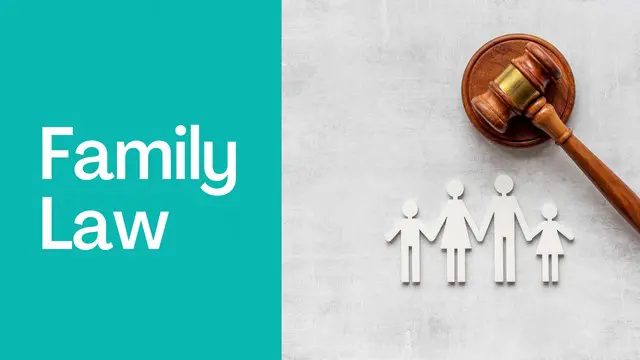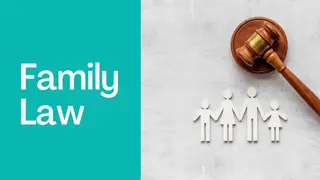
Family Law: Marriage, Divorce, Child Custody, Domestic Violence, Feminism & Gender Equity
EDURISE
Summary
- Certificate of completion - Free
- Reed courses certificate of completion - Free
- Tutor is available to students
Add to basket or enquire
Overview
Unlock the Intricacies of Family Law with the Family Law Masterclass
In the realm of law, few areas are as emotionally charged and impactful as family law. As families navigate complex legal issues, experts in family law are sought after to provide guidance, support, and resolutions. The Family Law Masterclass is your key to mastering this intricate field.
Demand for Expertise:
- The demand for family law professionals is steady, driven by the ever-evolving dynamics of family structures and relationships.
Business Importance:
- Legal firms specializing in family law rely on skilled professionals to handle a wide range of cases, from divorce and child custody to adoption and domestic violence.
Career Significance:
- A career in family law offers an opportunity to make a meaningful difference in the lives of individuals and families, often during their most challenging times.
Why Dive into Family Law:
Impactful Legal Specialization: Family law professionals handle cases that profoundly affect the lives of their clients, making their work incredibly impactful.
Emotional Intelligence: Understanding and managing emotions is integral to family law, and professionals in this field are adept at navigating sensitive situations.
Varied Legal Issues: Family law encompasses a wide array of legal issues, ensuring that no two cases are exactly alike, keeping the work dynamic and intellectually stimulating.
Problem Solving: You will become a skilled problem solver, finding creative solutions to complex family-related legal matters.
Positive Outcomes: Many family law professionals find immense satisfaction in helping families find resolutions that positively impact their lives.
Career Stability: The demand for family law experts remains stable, providing career stability in the legal field.
The Family Law Masterclass offers you a deep dive into family law, equipping you with the knowledge and expertise to excel in this emotionally charged yet fulfilling legal discipline. Explore the intricacies of family law, from divorce proceedings and child custody matters to the complexities of adoption and domestic violence cases.
Free Gift
- Course Completion PDF Certificate
- Tutor Support
Curriculum
Course media
Description
Learning Outcomes:
Foundational Knowledge of Family Law:
- Develop a comprehensive understanding of the principles and concepts that underpin family law, from the introduction to the various aspects of family legal matters.
Marriage and Relationship Recognition:
- Gain insights into the legal aspects of marriage, civil partnerships, cohabitation, and nullity, understanding the legal intricacies surrounding these relationships.
Divorce and Separation Procedures:
- Learn the procedures and legal requirements for divorce, separation, and annulment, including the complexities of property and financial matters.
Child Custody and Welfare:
- Explore child custody laws and their application, prioritizing the welfare of children in the context of divorce and separation.
Protecting Against Domestic Violence:
- Understand the legal aspects of domestic violence, the protection mechanisms available, and the legal recourse for victims.
Module Descriptions:
Introduction to Family Law:
- Module 1 provides an overview of family law, introducing the legal framework governing relationships and familial matters.
Marriage:
- Module 2 delves into the legal aspects of marriage, discussing its recognition, rights, and responsibilities of spouses.
Civil Partnership and Cohabitation:
- Module 3 explores civil partnerships and cohabitation, emphasizing the legal implications of these relationships.
Nullity in Marriage:
- In Module 4, you'll learn about nullity in marriage, understanding when a marriage may be legally declared null and void.
Divorce:
- Module 5 covers the legal procedures and requirements for divorce, separation, and the dissolution of marriages.
Child Custody:
- Module 6 is dedicated to child custody, addressing the legal considerations and welfare of children during and after divorce.
Property and Finance on Divorce:
- This module (Module 7) focuses on the complexities of property and financial matters arising from divorce.
Adoption Process:
- Module 8 explores the legal procedures and considerations in the adoption process, ensuring the welfare and rights of adopted children.
Domestic Violence:
- The final module (Module 9) examines domestic violence laws and protection mechanisms for victims, including legal recourse.
This course offers a comprehensive understanding of family law, addressing a wide range of legal matters related to marriage, relationships, divorce, child custody, property and finance, adoption, and domestic violence. Learners will gain insights into the legal framework governing family relationships and disputes.
Certificate of Completion
After completing the Family Law diploma course, you will be able to obtain your free PDF certificate of course completion.
Who is this course for?
Ideal Audience for this Course:
Law Students and Aspiring Lawyers:
- Law students seeking to deepen their knowledge of family law, as well as aspiring lawyers interested in specializing in family law.
Legal Professionals and Paralegals:
- Legal professionals and paralegals looking to expand their expertise into the field of family law or enhance their current understanding.
Counselors and Social Workers:
- Counselors and social workers dealing with families and individuals in challenging situations who want a legal perspective to better serve their clients.
Divorce Mediators:
- Divorce mediators aiming to understand the legal intricacies of divorce, child custody, and property and finance matters for more effective mediation.
Family Therapists and Psychologists:
- Family therapists and psychologists interested in the legal aspects of family dynamics and relationships, particularly in cases involving divorce and domestic violence.
Parents and Guardians:
- Parents and guardians looking to gain a clear understanding of child custody laws and the legal rights and responsibilities of parents.
Victims of Domestic Violence:
- Individuals who have experienced domestic violence and wish to understand their legal rights and seek recourse within the legal system.
Educators and Academics:
- Educators and academics in the fields of law, social work, or psychology who want to integrate family law concepts into their teaching or research.
Law Enforcement and First Responders:
- Law enforcement personnel and first responders seeking to better understand domestic violence laws and legal procedures when responding to domestic violence incidents.
General Public:
- Anyone from the general public interested in gaining a foundational understanding of family law to navigate personal or familial legal matters more effectively.
This course caters to a diverse audience, offering comprehensive insights into family law topics, from marriage and divorce to child custody, adoption, and domestic violence. Whether you are a legal enthusiast, a professional in a related field, or an individual dealing with family-related legal matters, this course provides valuable knowledge.
Requirements
The Family Law course has no formal entry requirements.
Career path
- Family Law Paralegal: Entry-level position with a typical UK salary ranging from £20,000 to £30,000 per year.
- Family Law Solicitor or Attorney: With experience and qualifications, salary can advance to between £31,000 and £60,000 annually.
- Senior Family Law Barrister or Partner: Experienced professionals in these roles may earn £61,000 to £100,000 or more.
Questions and answers
Currently there are no Q&As for this course. Be the first to ask a question.
Certificates
Certificate of completion
Digital certificate - Included
Reed courses certificate of completion
Digital certificate - Included
Will be downloadable when all lectures have been completed
Reviews
Currently there are no reviews for this course. Be the first to leave a review.
Legal information
This course is advertised on reed.co.uk by the Course Provider, whose terms and conditions apply. Purchases are made directly from the Course Provider, and as such, content and materials are supplied by the Course Provider directly. Reed is acting as agent and not reseller in relation to this course. Reed's only responsibility is to facilitate your payment for the course. It is your responsibility to review and agree to the Course Provider's terms and conditions and satisfy yourself as to the suitability of the course you intend to purchase. Reed will not have any responsibility for the content of the course and/or associated materials.


